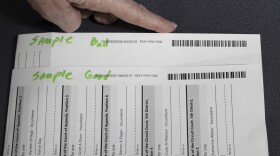April Ehrlich
April Ehrlich began freelancing for Jefferson Public Radio in the fall of 2016, and then officially joined the team as its Morning Edition Host and a Jefferson Exchange producer in August 2017.
She previously worked as a reporter for the Roseburg News-Review, where she covered city government and housing. Before that, she covered the oil and gas industry and local government on the Oregon-Idaho border.
April served a two-year stint with AmeriCorps, where she worked with nonprofits helping low-income communities in rural Oregon. She earned a Bachelor’s Degree in English at Cal-State University, Fullerton, where she worked as an editor for the campus paper.
When she is not at work or napping between shifts, April is likely hiking through nearby forests with a rambunctious border collie, or reading fiction at home with her two favorite cats.
-
In Oregon's 5th Congressional District, centrist incumbent Rep. Kurt Schrader, who had President Biden's backing, lost to his more progressive opponent, Jamie McLeod-Skinner.
-
Rural residents are waiting in line for hours to get prescriptions filled because pharmacies are closing down or limiting hours. Pharmacy companies blame high insurance fees and employee burnout.
-
Farmers in southern Oregon are pumping groundwater onto fields. They're not getting lake water for irrigation because water levels there were too low. Now, homeowners' wells are running dry.
-
An investigation into FEMA claims after 2020's historic wildfires in Oregon and California reveals wide fluctuations in approval rates and denials of people who met aid criteria.
-
The Black teenager was killed Nov. 23 by a white middle-aged man who confronted him for playing loud music. Ellison's death is causing soul searching in the mostly white community where he lived.
-
As the coronavirus shut down homeless shelters in Southern Oregon, civic leaders told those in need to relocate to the nearby woods. Now sheriff's deputies are relocating them before fire season.
-
Rural homelessness in Oregon isn't as visible as its urban equivalent, but it's a major problem. Even when money is available, local officials say providing resources could make the problem worse.





